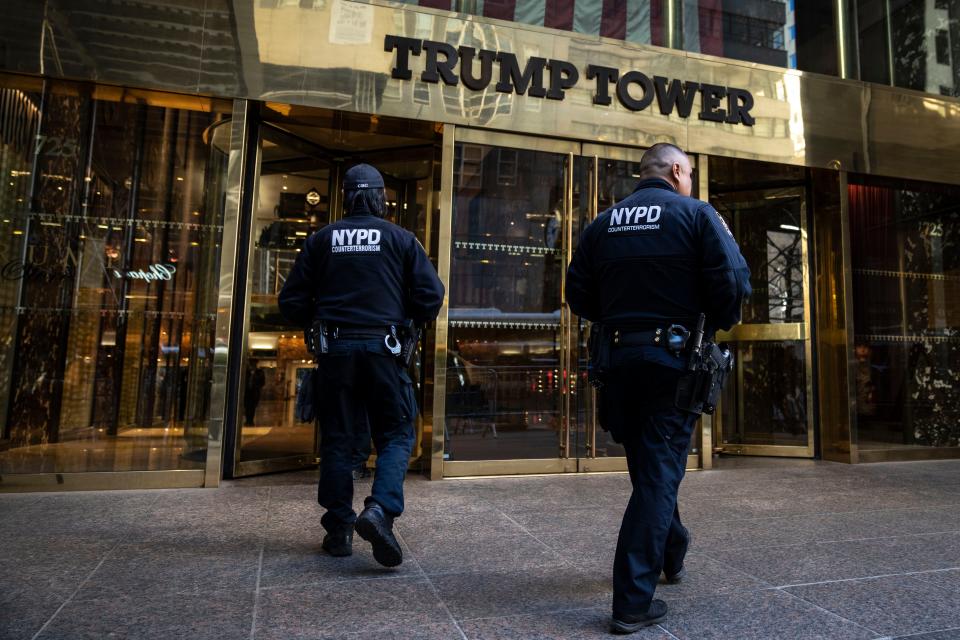Donald Trump must post $175 million to shield assets during civil fraud appeal, court says
- Oops!Something went wrong.Please try again later.
- Oops!Something went wrong.Please try again later.
Former President Donald Trump and his co-defendants need to post only a $175 million bond or deposit to shield their assets as they appeal their real estate fraud trial loss, an appeals court ruled Monday.
The ruling helps Trump as he has scrambled to come up with the cash before New York Attorney General Letitia James could start going after his assets. The appeals court said in the ruling that the defendants have 10 days to post the bond or deposit. The presumptive Republican presidential nominee has been struggling under the weight of not just the $454 million civil fraud judgment, but also an $83.3 million defamation trial loss to advice columnist E. Jean Carroll.
"We will abide by the decision of the Appellate Division, and post either a bond, equivalent securities, or cash," Trump posted on Truth Social soon after the ruling. He also attacked the the $454 million judgment.
"This also shows how ridiculous and outrageous (Judge Arthur) Engoron’s original decision was at $450 Million," Trump added. "I DID NOTHING WRONG, AND NEW YORK SHOULD NEVER BE PUT IN A POSITION LIKE THIS AGAIN. BUSINESSES ARE FLEEING, VIOLENT CRIME IS FLOURISHING, AND IT IS VERY IMPORTANT THAT THIS BE RESOLVED IN ITS TOTALITY AS SOON AS POSSIBLE. THANK YOU!"
New York City has among the lowest crime rates of large U.S. cities and it saw significant drops in shootings, murders, robberies and sexual assaults among other categories of crime last year. It also reached an all-time high in private sector employment.

In Carroll's case, Trump managed to post a bond of nearly $92 million shortly before she could have started collecting. The former president has filed appeals in both cases.
In a statement, James said the full judgment in the case still stands and "Donald Trump is still facing accountability for his staggering fraud."
Trump lawyer Alina Habba said in her own statement that the appeals court order is "the first important step in fighting back against Letitia James and her targeted witch hunt against my client which started before she ever stepped foot in office."
The $454 million judgment that Trump − along with some business entities − is facing includes about $355 million in what trial Judge Arthur Engoron ruled were ill-gotten gains from fraudulently inflating assets to get better loan and insurance terms. The remainder is interest. Engoron also imposed judgments totaling about $10 million against Trump's oldest sons, Don Jr. and Eric, and former Trump Organization Chief Financial Officer Allen Weisselberg.
More: Donald Trump faces more than $500 million in legal penalties. Will he pay it? Can he appeal?
The general requirement to post a bond or deposit while appealing a court loss is designed to ensure the winner in the case can collect on the judgment when the appeal is over.
Trump says 30 insurers turned him down
Trump's legal team pleaded for court intervention Monday, saying in a court filing that 30 insurance companies had refused to take real estate as collateral in exchange for a bond to cover the approximately $464 million judgment in the case, including about $454 million imposed against Trump.
"Very few bonding companies will consider a bond of anything approaching that magnitude," the Trump team wrote. "The remaining handful will not 'accept hard assets such as real estate as collateral,' but 'will only accept cash or cash equivalents (such as marketable securities).'"
Trump would need nearly $1 billion in cash or cash equivalents in order to collateralize the bond and still have enough money left over to keep his business running and pay his other debts, Trump's legal team said.
"As a result, 'obtaining a bond for $464 million is a practical impossibility,'" they said.
James argued in a March 11 court filing that there's a significant risk Trump will try to evade the judgment or make enforcing it harder after an appeal. She said Trump and his co-defendants − which include his two adult sons, some former Trump Organization executives, and business entities − violated court orders by transferring $40 million in cash without informing an independent monitor appointed to ensure the defendants didn't get rid of their assets while the case was pending.

One of those transfers, the monitor said in a letter, was $29 million to Trump himself to pay taxes. The remainder, she concluded, was used to pay insurance premiums and for a deposit of more than $5 million to block E. Jean Carroll from enforcing an earlier sexual abuse and defamation judgment she received against Trump while he appealed. The Trump defendants were supposed to report any transfer above $5 million.
James pushes back on Trump bond claims
An attorney in James' office, Dennis Fan, pushed back on the Trump assertions Wednesday in a reply document he asked the court to review.
Fan said one Trump Organization lawyer who submitted a statement in the Trump filing was unreliable because the lawyer himself was involved in the fraudulent conduct in the case, including tripling the size of Trump's apartment in Trump Tower and helping prepare two years of false financial statements. Another lawyer who submitted a statement was an expert witness at trial who, according to the judge, lacked credibility, Fan said.
Fan also argued that the Trump complaints were based on the false premise that the entire bond had to come from one bonding company instead of multiple companies that can spread the risk.
In February, Ohio-based bonds adviser Mark Levinson told USA TODAY Trump could need multiple bonding companies to team up and pool their efforts to cover a bond upwards of $450 million.
Fan also noted that the Trumps hadn't provided documentary evidence about the terms on which he offered up real estate as collateral. The bonding companies may have refused to take the real estate because that would generally require a property appraisal and the real estate is "not nearly as valuable as defendants claim," Fan argued.
Fan said that if the Trump claims about the bond were true, they should have proposed a serious alternative that would ensure the attorney general will eventually be able to collect on the judgment. They could have, for example, offered up real estate for the courts to hold onto while the appeal unfolds.
What happens if Trump can't post bond?
James has already pledged to go after Trump's assets if he doesn't come up with an appropriate bond or deposit.
"If he does not have funds to pay off the judgment, then we will seek, you know, judgment enforcement mechanisms in court, and we will ask the judge to seize his assets," James told ABC News.
"He engaged in this massive amount of fraud, and it wasn't just a simple mistake, a slight oversight, the variations were wildly exaggerated and the extent of the fraud was staggering."
Those claims were mirrored by two rulings from trial Judge Arthur Engoron, who said Trump fraudulently inflated his assets by $812 million to $2.2 billion from 2014 to 2021. Lawyers defending those valuations made "fantasy world" claims, Engoron said, such as describing square footage measurements as subjective to explain why Trump's residence in Trump Tower was listed at 30,000 square feet when it's really fewer than 11,000.
"A discrepancy of this order of magnitude, by a real estate developer sizing up his own living space of decades, can only be considered fraud," Engoron wrote in one ruling.
Trump and his lawyers have repeatedly argued that he repaid the loans at issue in the case and he is being politically persecuted.
"The $464 million penalty in this case has been aptly described as 'using a Hellfire missile to annihilate an [alleged] shoplifter,'" they said as they pleaded for the appeals court's help.
If Trump can't come up with the $175 million bond or deposit within 10 days, James can start the collection process. That could mean "liquidating bank accounts, taking his assets, not just in New York, but any place in the United States," Mitchell Epner, a longtime New York litigator and former prosecutor, told USA TODAY.
James could collect funds from New York bank accounts the most quickly, followed by Trump property that isn't real estate, and lastly, real estate, Epner said. "If there are bank accounts in New York, those can be frozen essentially immediately if she already knows where they are, and the turnover of the funds in a bank account would be measured in days or weeks."
This article originally appeared on USA TODAY: Trump must post $175 million to shield assets in NY civil fraud appeal

